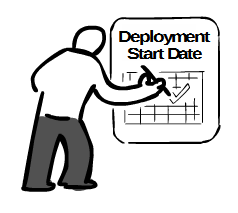 This weekend I witnessed a true conflict in value perception. We're not talking values like:
- We treat others with respect
- We are humble
This weekend I witnessed a true conflict in value perception. We're not talking values like:
- We treat others with respect
- We are humble
Rather, it's about what the Customer (Product Owner), the Vendor (Core Team), and the I (Facilitator) believe has value. I see direct value, like actual delivery of product, and indirect value, like mitigating risk by facilitating communications.
We started a deployment cycle that is going to take some time. The team activities are clearly defined and level-of-effort have been estimated. Dates in which potential risks could arise have been identified. This is all good. Until an activity begins, we won't be certain if a risk will be fully realized. This is why I'm a really big proponent of daily communications. Every morning, we have a 15 minute (status) meeting. (The culture demands that we call it a status meeting so I'm good with it.) The extended team is distributed (3 locations) so this is a little challenging.
Though I stressed to everyone the importance of daily communications (at a minimum), this weekend I was a little shocked at what happened. Deployment activities were taking place over the weekend. There was a trigger point for a risk that had been identified. During the Friday status meeting, the Customer informed the team that they would not be on the status call. Though I had agreed to be on the status call, this was a bit of a paradox. I am a facilitator. Per the contract, I can not act on behalf of the customer. IF the team ran into a roadblock over the weekend, the customer would not know until Monday morning. We could potentially be delayed by two days until the customer could provide feedback and direction.
So, what happened over the weekend? The team did indeed run into a roadblock. But, they were empowered enough to get the work done. Because risks had been previously identified, a mitigation strategy was in place. The team was able to bring in team members, over the weekend, without having to consult with the customer.
I still believe if the deployment is going to be a success, all parties must be fully committed. We're all in this together. I'll never ask a member of my team to do something that I wouldn't be prepared to do myself.
Something David Bland said at the APLN DC meeting really resonated with me this weekend. He said,
When dealing with distributed teams, keep the feedback loops tight.
David could not have been more right. We dodged a bullet this time around. Empowering the team allowed us to do this. But, the customer took an unnecessary risk, by intentionally lengthening the feedback loop from 24 to 72 hours.
Like the image? Find it at Pictofigo
